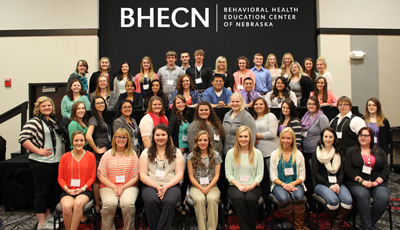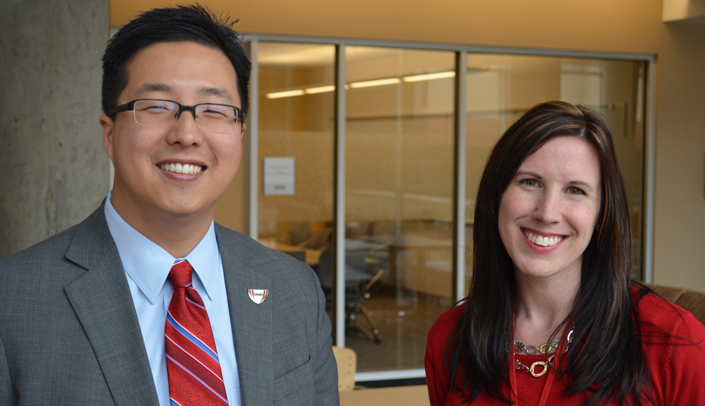A mentor can make a huge difference in a student’s life.
Even a virtual mentor.
In a cutting-edge attempt to address the looming shortage of behavioral health professionals, the Behavioral Health Education Center of Nebraska (BHECN) has created a “Virtual Mentorship Network” to pair promising young students with behavioral health professionals.
 |
Forty-one rural Nebraska high school students attended the second annual BHECN High School Ambassador Conference in Kearney on April 4. |
The pilot project is being funded with a grant from Rural Futures.
BHECN launched its Ambassador Program, based on UNMC’s Rural Health Opportunities Program, in 2012 as a pipeline to create future behavioral health professionals.
“The Ambassador Program is a long-term solution to a looming problem,” said Heidi Keeler, Ph.D., BHECN’s Director of Educational Design.
That problem: Half of Nebraska’s mental health providers are 50 or older, said Howard Liu, M.D., BHECN’s medical director.
Dr. Liu said that as the workforce begins to retire, today’s waits for behavioral health assistance — already sometimes as long as a month or two — could stretch to six months or more.
The challenge is the program’s limited reach.
“We currently maintain contact with students via live events that happen once a year,” Dr. Keeler said. “That’s a start, but we need more personal interaction — a way to reach youth who may be interested but are unable to travel to live events.”
The virtual mentorship network will provide a way to connect students to behavioral health professionals between conference and after conferences, Dr. Liu said.
“With this grant, we can provide a network,” he said. “With current technology, we can set up monthly meetings between interested students and providers.
“The tricky thing is, provider time is precious,” Dr. Liu said. Mentorship meetings could feature multiple students, including mixing high school and college-age youth.
The grant of $18,000 will fund pilot mentorship programs in psychiatry and psychology, connecting professionals with interested high school and college students.
“The program will use distance technology that kids already use – we’re catching them with a behavior pattern they’ve already established,” Dr. Keeler said.
It will take some time to see the program’s impact.
“This is a long-term solution,” Dr. Keeler said. “We have students now who are pursuing behavioral health education after participation in the live program. We can build on that initial success.”
The organizers are excited.
“BHECN is about making connections — trying to connect educational resources to the right people,” Dr. Keeler said. “This program is one way to strengthen those relationships.”
